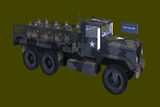LOD: Difference between revisions
(Added Animations reference & link) |
(some definitions added) |
||
| Line 13: | Line 13: | ||
Defines where the model will collide with other objects.<br> | Defines where the model will collide with other objects.<br> | ||
Should be '''very''' simple, and has to fulfil the following criteria in order to work: | Should be '''very''' simple, and has to fulfil the following criteria in order to work: | ||
* Object must be [[Named Selection | named]]. | * Object must be [[Named Selection | named]] ComponentXX (where XX is a number between 01 and 99). | ||
* Must have 'Mass' (Alt-M). | * Must have 'Mass' (Alt-M). | ||
* Must be closed and convex ([[Validating Geometries]]). | * Must be closed and convex ([[Validating Geometries]]). | ||
Geometry objects should have a thickness of at least .5 meters in order to work properly. | |||
<br clear="all"> | <br clear="all"> | ||
| Line 25: | Line 26: | ||
== Hit-points == | == Hit-points == | ||
Hit-pointLODs define, via unconnected [[Named Selection|named]] vertexes, where certain destroyable parts of a model are (e.g. wheels, lights, etc.). | |||
<br clear="all"> | <br clear="all"> | ||
| Line 32: | Line 34: | ||
== Paths == | == Paths == | ||
On models that will be navigated by AI units (e.g. buildings), the paths have to be defined with this LOD. | |||
<br clear="all"> | <br clear="all"> | ||
== Roadway == | == Roadway == | ||
If a units is supposed to be able to stand ''on top'' of a model, that surface has to be defined by a RoadwayLOD. | |||
Make sure that a RoadwayLOD doesn't overlap with a GeometryLOD, or the unit will start to wobble at those points. | |||
<br clear="all"> | <br clear="all"> | ||
Revision as of 07:12, 22 July 2006
What's a LOD?
LOD means Level of Detail, and is a method of defining, via different variations of a model, how high or low the viewable quality of the model should be, and how it should interact with the environment.
<Resolution>
Defines which model to use, depending on several in-game conditions (view-distance, number of objects, CPU utilization, etc.). Can be any value from 0.000 to 9999(what's the limit?).
Geometry
Defines where the model will collide with other objects.
Should be very simple, and has to fulfil the following criteria in order to work:
- Object must be named ComponentXX (where XX is a number between 01 and 99).
- Must have 'Mass' (Alt-M).
- Must be closed and convex (Validating Geometries).
Geometry objects should have a thickness of at least .5 meters in order to work properly.
Fire Geometry
Defines where the model will collide with bullets & rockets. If this LOD is not present the Geometry LOD will be used instead.
- Must be closed and convex (Validating Geometries).
Hit-points
Hit-pointLODs define, via unconnected named vertexes, where certain destroyable parts of a model are (e.g. wheels, lights, etc.).
Memory
Named Selections that are used to define lights, vehicle entry points, etc., as well as control points for Animations.
Paths
On models that will be navigated by AI units (e.g. buildings), the paths have to be defined with this LOD.
Roadway
If a units is supposed to be able to stand on top of a model, that surface has to be defined by a RoadwayLOD.
Make sure that a RoadwayLOD doesn't overlap with a GeometryLOD, or the unit will start to wobble at those points.
LandContact
Where the object touches the ground. (Defined by single vertexes per contact point.)
ViewGeometry
View - Cargo
What a co-driver or cargo passenger can see of the model.
View - Cargo - Fire Geometry
View - Cargo - Geometry
View - Commander
View - Commander -Fire Geometry
View - Commander -Geometry
View - Gunner
View - Gunner - Fire Geometry
View - Gunner - Geometry
View - Pilot
What the driver can see of the model.
View - Pilot - Fire Geometry
View - Pilot - Geometry


